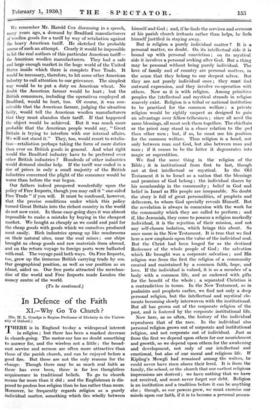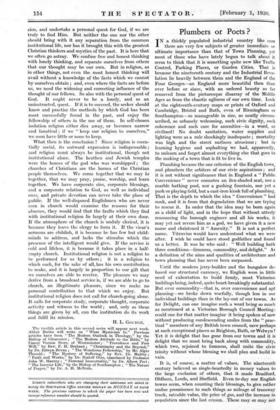In Defence of the Faith
XI.—Why Go To Church ?
(Dr. L. Goudge is Regius Professor of Divinity in the ITniver- sity of Oxford.]
THERE is in England to-day a widespread interest -I- in religion ; but there has been a marked decrease in church-going. The motor-car has no doubt something to answer for, and the wireless not a little ; the broad- cast service and sermon are often more attractive than those of the parish church, and can be enjoyed before a good fire. But these are not the only reasons for the change. Though there may be as much real faith as there has ever been, there is far less thoughtless acquiescence in traditional beliefs. To go to church means far more than it did ; and the Englishman is dis- posed to profess less religion than he has rather than more. Moreover; he frequently regards religion as a purely -individual matter, something which lies - wholly between himself and God ; and, if he finds the services and sermons at his parish church irritants rather than helps, he feels himself justified in staying away. . But is religion a purely individual matter ? It is a personal matter, no doubt. On its intellectual side it is bound up with personal conviction ; on its mystical. side it involves a personal seeking after God. But a thing may be personal without being purely individual. The love of family and of country are personal matters, in the sense that they belong to our deepest selves. But they are, not purely individual ones ; they must find outward expression, and they involve co-operation with others. Now so it is with religion. Among primitive peoples the intellectual and mystical strands in religion scarcely exist. Religion is a tribal or national institution to be practised for the common welfare ; a private religion would be rightly suspect as designed to gain an advantage over fellow-tribesmen ; since all need the same blessings, all must seek them together. The chieftain or the priest may stand in a closer relation to the god than other men ; but, if so, he must use his position for the common welfare. Thus religion is a bond, not only between man and God, but also between man and man ; if it ceases to be the latter it degenerates into magic or superstition.
We find the same thing in the religion of the Bible ; it is institutional from first to last, though not at first intellectual or mystical. In the Old Testament it is to Israel as a nation that the blessings and promises of God belong ; the individual shares by his membership in the community ; belief in God and belief in Israel as His people are inseparable. Na doubt the story is full of great personalities, of prophets and deliverers, to whom God specially reveals Himself. But the revelation is always in connexion with the work for the community which they are called to perform ; and if, like Jeremiah, they come to possess a religion markedly individual, it is the rejection of their mission, and not any self-chosen isolation, which brings this about. So once more in the New Testament. It is true that we find here a new emphasis upon the value of the individual soul. But the Christ had been longed for as the destined Redeemer of the whole people of God ; the salvation which He brought was a corporate salvation ; and His religion was from the first the religion of a community created and maintained by a common faith, hope, and love. If the individual is valued, it is as a member of a body with a common life, and as endowed with gifts for the benefit of the whole ; a separated Christian is a contradiction in terms. In the New Testament, as in psalmists and prophets earlier, we find not only a deep personal religion, but the intellectual and mystical ele- ments becoming slowly interwoven with the institutional. But all has grown out of the corporate religion of the past, and is fostered by the corporate institutional life. Now here, as- so often, the history of the individual reproduces that of the race. In the individual also personal religion grows out of corporate and institutional religion, and not corporate out of individuaL Just as from the first we depend upon others for our nourishment and growth, so we depend upon others for the awakening and development, not only of our intellectual and emotional, but also of our moral and religious life. If Kipling's Mowgli had remained among the wolves, he could never have risen above their leveL It is from the family, the school, or the church that our earliest religious impressions are derived ; we have nothing that we have not received, and must- never forget our debt. Religion is an institution and a tradition before it can be anything else ; though, as our powers grow, we must exercise our minds upon our faith, if it is to became a personal posses- sion, and undertake a personal quest for God, if we are truly to find Him. But neither the one nor the other should bring with it any separation from the common institutional life, nor has it brought this with the greatest Christian thinkers and mystics. of the past. It is here that we often go astray. We confuse free and honest thinking with lonely thinking, and separate ourselves from others that our thought may be our own. But in religion, as in other things, not even the most honest thinking will avail without a knowledge of the facts which we cannot' by ourselves obtain ; and, even where the facts are before us, we need the widening and correcting influence of the thought of our fellows. So also with the personal quest of God. It ought never to be a lonely, and so an uninstructed, quest. If it is to succeed, the seeker should know and practise the methods by which God has been most successfully found in the past, and enjoy the fellowship of others in the use of them. In self-chosen isolation religion either dies away, or becomes narrow and fanatical ; if we " iceep our religion to ourselves," we soon have little or none to keep.
What then is the conclusion ? Since religion is essen- tially social, its outward expression is indispensable ; and religion must always be institutional, though not institutional alone. The heathen and Jewish temples were the homes of the god who was worshipped ; the churches of Christians are the homes of the Christian people themselves. We come together that we may be together, that we may pray, praise, worship, and learn together. We have corporate sins, corporate blessings; and a corporate relation to God, as well as individual ones, and private devotion can never take the place of public. If the well-disposed Englishmen who are never seen in church would examine the reasons for their absence, they would find that the faults which they find with institutional religion lie largely at their own door. If the atmosphere of the church is unduly clerical, it is because they leave the clergy to form it. If the vicar's sermons are childish, it is because he has few but child- minds to address, and lacks the stimulus which the presence of the intelligent would give. If the service is cold and lifeless, it is because it takes place in a half- empty church. Institutional religion is not. a religion to be performed for us by others ; it is a religion to which each, for the sake of all, has his own contribution. to make, and it is largely in proportion to our gift that we ourselves are able • to receive. The pleasure we may derive from a broadcast service is, if we are able to go to churoh, an illegitimate pleasure, since we make no personal contribution to that which we enjoy. But institutional religion does not call for church-going alone. It calls for corporate study, corporate thought, corporate activity and witness to the world-; and, only as these things are .given by all, can the institution do its work and fulfil its mission.
• H. L. GOUDG.
The twelfth article in this second series will appeir next week. 'Abbot Butler will write on " What •Mysticism Is." Previous articles have been " The Modem Outlook in Theology," by the Bishop of Gloucester ; " The Modern Attitude to the Bible," by 'Canon- Vernon Siorr,- of Westminster ; " Providence and Free Will," by Rev. F. H. Brabant ; " Christianity and the Beyond," by Dr. Edwyn Bevan ; " The Wondrous Fellowship," by Mr. Alger Thorold ; The Mystery of Suffering," by Rev. Dr. Maltby ; " Faith and Works," by Dr. Rudolf Otto, translated by Professor John W. Harvey ; " Personal Immortality," by Dr. Albert Peel ;
The Interior Life," by the Bishop of Southampton ; " The Nature of Prayer," by Dr. A. H. McNeile.







































 Previous page
Previous page